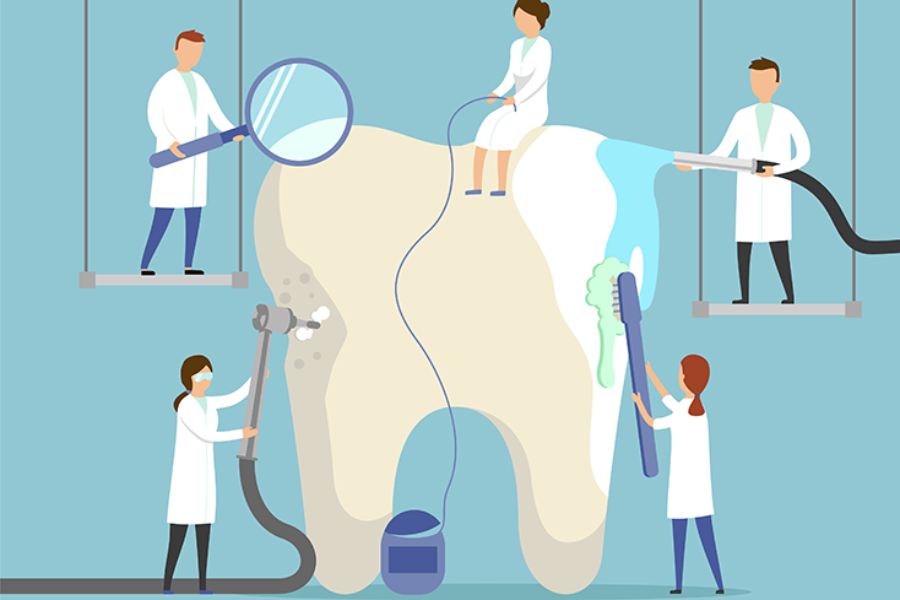By David Kouba
Several years ago, I received an electronic toothbrush as a birthday present. An interesting gift perhaps, but also a fabulous creation; just one button and the bristles do the rest. In addition to giving me clean teeth, using the toothbrush leaves me temporarily unable to speak, hear, type or write — which, in turn, provides the perfect chance to let my mind wander twice per day.
On one such occasion, I found myself thinking about dental care generally, and I began to wonder about how the field has evolved over the last century. It turns out that a specialty that once focused on treating severe problems with extractions now revolves around preventative care and education. This evolution struck me; I thought about mental health care and whether the approaches we use to care for our mouths could inform the ways we might care for our minds.
Fostering Healthy Habits At An Early Age
One strategy that is central to dental care is lifelong, preventative self-care. Children learn at an early age that they should brush their teeth daily, and they are reminded to do so repeatedly until the practice becomes a habit. The result of this consistency is that many people continue taking care of their teeth for the rest of their lives — a practice that helps millions of people to avoid painful, costly dental procedures.
I’ve often thought that similar preventative strategies could promote our mental health. Many possible approaches to daily maintenance of mental health exist. At the stage when we begin to teach brushing and flossing, we could also teach children how to use breathing techniques, physical exercises and communication skills when they feel overwhelmed or anxious — and we can remind them to use these coping skills when appropriate.
Teachers, parents and caregivers could impress upon children the importance of self-care and encourage kids to take time for themselves, monitor their feelings, talk openly about their challenges and provide support to their peers. While preventative efforts promoting mental health are already out there, expanding those efforts, especially at an early age, could enhance coping skills and improve overall mental health.
Encouraging Regular Check-Ups At Every Life Stage
Daily self-care is not the only kind of prevention used to achieve better dental health. We are widely encouraged — again from a young age — to visit a dentist for regular check-ups, as often as twice a year. The purpose of these appointments is not to treat dental problems; it is to prevent those problems from arising in the first place. During these appointments, dentists have a variety of cavity prevention methods, including fluoride treatments, sealants, x-rays, professional cleanings, and new toothbrushes and floss, to name a few.
Again, similar strategies would promote mental health. Mental health professionals are growing in number, and with the adoption of telehealth, care is increasingly accessible. Practitioners come from increasingly diverse backgrounds, embrace a range of theoretical orientations and specialize in a wide variety of techniques. However, most people do not consult a mental health professional until after they experience a mental health challenge or crisis. When compared to dental care, this begs the question: Would people benefit from regular mental health check-ups even if they are not experiencing a more serious issue?
There is evidence to suggest that people would benefit significantly. Regular appointments would encourage people to reflect on their mental health and to think critically about what challenges they are facing. Moreover, the average time between a person’s first symptom and intervention is 11 years. Thus, regular check-ups would provide an earlier opportunity to assess how someone is doing, identify potentially harmful behaviors, suggest coping mechanisms and provide information. When necessary, a regular check-up could also help connect people needing a higher level of care to the appropriate services.
Identifying And Assisting At-Risk Individuals
One significant benefit to regular dental check-ups is identifying people at greater risk for more significant problems, such as spotting early signs of tooth decay or gum disease, and responding before more serious issues arise. Providing dental care to large portions of the population also helps identify problems impacting a specific population so that community-based responses can be developed.
Increasing the regularity of mental health check-ups could offer similar benefits by improving the ability to recognize and provide resources to vulnerable and at-risk individuals and populations. For example, a person who has family members with mental illness and may be at a higher genetic risk for developing symptoms themselves.
Modeling Recovery
It’s not uncommon to see illustrations in dental offices using before and after pictures to demonstrate the differences dental care can make — providing information and hope to people with similar issues by showing solutions to those problems exist.
Similar approaches already exist to support mental health; for example, peer support, where people in recovery assist those facing similar challenges. However, there could be ways to increase the concept of peer modeling — or making it a standard part of any treatment plan — that motivates people to focus on mental health and believe in the possibility of recovery.
Decreasing Stigma
Dental problems have never come with the kind of stigma that accompanies mental health issues. For example, most people would empathize, rather than judge someone, for having a toothache. This greater understanding might stem, in part, from the open discussion and normalizing of dental health from a young age. If so, it stands to reason that using these approaches might foster greater awareness and compassion, and reduce stigma, when people are facing mental health challenges.
National attention to mental health has picked up in recent years, but much remains to be done to promote mental health and provide relief to those in need. Obviously, this complex and multifaceted challenge cannot be solved by a singular item, like a toothbrush. That said, thinking about mental health from a different perspective might provide new solutions — even when that different perspective is from one of our simplest daily routines.
David Kouba is an attorney who has practiced law for almost 20 years. He also holds a master’s degree in clinical mental health counsel and enjoys promoting mental health and well-being within the legal profession and among society in general.
Source: https://nami.org/Blogs/NAMI-Blog/March-2022/What-Mental-Health-Care-Can-Learn-from-Dental-Health-Care-Strategies




